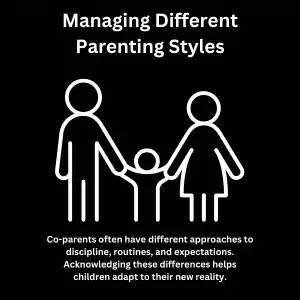Families facing separation or divorce encounter unique challenges when establishing a co-parenting relationship. The transition from one household to two creates emotional and logistical hurdles that can feel overwhelming. Many parents struggle with Texas-specific custody arrangements while trying to maintain stability for their children and ensure both family members remain involved in the child’s upbringing.
Co-parenting after separation requires an entirely new approach to family life. The familiar routines and communication patterns you once relied on must evolve, especially when one parent is now managing responsibilities separately. Families often find themselves navigating unfamiliar territory without clear guidance on how to align differing parenting styles.
Our family law team regularly meets with parents who feel lost in this process. We understand the specific challenges of managing school schedules between households, coordinating with local extracurricular activities, and maintaining consistency across different parenting styles—all while helping each co parent stay actively involved in their child’s upbringing.

Healthy co-parenting creates security for children during uncertain times. When divorced or separated parents work together despite their differences, children develop greater emotional resilience and stronger mental health. This collaboration directly impacts your child’s well-being for years to come, especially when both co parents are committed to respectful communication and shared decision-making.
Research consistently shows that children thrive when both parents remain actively involved in their lives after separation. A healthy co-parenting dynamic allows children to maintain meaningful relationships with both parents, whether through joint custody or other arrangements that support child adjustment. Your commitment to effective co-parenting helps your child adjust to their new family unit and supports long-term mental health.
Families benefit from our community’s strong support networks and resources designed specifically for co-parenting arrangements. Local parenting classes and counseling services provide practical strategies tailored to Texas custody situations. These resources help establish the cooperative co-parenting relationships that children involved in separation or divorce need for healthy development.
Effective communication forms the backbone of any co-parenting relationship. When communication breaks down, children involved often become caught in the middle. Effective communication between co-parents creates a supportive environment—especially when joint custody arrangements or younger children are involved.
Always speak respectfully about the other parent, especially when children are present. Your child internalizes how you talk about their other parent as part of their own identity. Negative comments can damage your child’s self-esteem and sense of security, particularly when kids thrive on seeing both parents as a support system in their lives.
Focus conversations with your former spouse on your child’s needs. Keep discussions businesslike and centered on parenting situations. This approach helps maintain boundaries while ensuring necessary information gets shared without complicating your personal relationship or projecting your own feelings into discussions that should prioritize your child’s well-being.

A detailed co-parenting plan provides clarity for everyone involved. Families should develop plans that address the specific requirements of Texas family courts while meeting their unique family needs.
Your cooperative co-parenting plan should include details about the parenting schedule, including regular visitation schedules, holidays, and special occasions. Be sure to address how school events, parent-teacher conferences, children’s schedules, and other important activities will be handled. Including details about transportation between one parent’s home and the other prevents misunderstandings.
Financial responsibilities should be clearly outlined, including how child support and shared expenses will be managed. Decision-making protocols for education, healthcare, and extracurricular activities must be established. Don’t forget to define how changes to the plan will be negotiated when circumstances evolve.
Former partners must navigate Texas family law requirements when establishing co-parenting arrangements. The Standard Possession Order provides a framework that many co-parents use as a starting point. Understanding these legal parameters helps create workable joint custody arrangements.
Local school calendars and community activities create unique scheduling considerations for families. Coordinating between households becomes more manageable when the two parents understand the community rhythms. Many co-parents successfully align their schedules with local events and school breaks.
Texas weather patterns also influence co-parenting logistics, particularly during severe storm seasons. Parents should include contingency plans for weather emergencies in their co-parenting agreements. Having established protocols for these situations prevents last-minute conflicts.

Co-parents often have different approaches to discipline, routines, and expectations. These differences can create negative feelings, tension and confusion. Acknowledging these differences helps children adapt to their new reality.
Establish core values and rules that remain consistent across both households. Children benefit from knowing certain fundamental expectations remain the same regardless of where they’re staying. These consistent elements provide security during transitions.
Allow for flexibility in less critical areas of parenting. Each parent’s house will naturally have its own culture and household routines. Teaching children to adapt to these differences builds their resilience and flexibility.
Digital tools have revolutionized how divorced parents coordinate childcare responsibilities. Co-parenting apps provide neutral platforms for scheduling, expense tracking, and information sharing. These tools minimize direct conflict while ensuring both parents remain informed about their child’s life, from school assignments to doctor’s visits.
Free options offer basic scheduling and communication functions that work well for many families. These platforms allow both parents to view and update information about the child’s activities, medical appointments, and school events—ideal for situations where both parents work and need a centralized system with a reliable internet connection.
Paid services provide cooperative co-parenting features. These platforms include tone checkers for communications, expense documentation, and secure messaging. Many Woodway family courts recognize these tools as valid records of co-parenting interactions, especially in cases involving detailed tracking of doctor’s visits or school-related logistics.
Woodway offers several support resources designed for co-parenting families. Local counseling centers provide help for parents, especially when poor communication with a former partner has made parenting more difficult. These professionals understand how to support all involved parental figures.
Parent education programs help separated parents develop effective co-parenting skills. Many families benefit from these classes that focus on communication strategies, especially when parents live in separate households and need consistent tools to co-manage their child’s routine.
Support groups connect you with other parents facing similar challenges. Sharing experiences provides emotional support and practical advice. Many successful co-parenting relationships develop through these connections, even when cooperation with a former partner initially seemed unlikely.

Transitions between one parent’s house and the other can be emotionally challenging for children. Creating consistent routines around these exchanges helps children adjust to moving between households.
Keep exchanges brief and pleasant, focusing on your child rather than interacting with your ex-partner. Children pick up on tension between parents during these moments. A united front during transitions reassures children that both parents support their relationship with the other parent.
Allow children time to adjust after arriving at your home. They may need space to process their feelings about leaving their other parent’s house. Supporting this adjustment period without questioning them about the other household shows respect for your child’s emotional well-being.
Holidays and occasions often create tension in co-parenting relationships. Planning well in advance prevents last-minute conflicts that can ruin celebrations. Many families develop alternating schedules for major holidays that provide predictability.
Consider creating new traditions that work within your co-parenting arrangement. These adaptations help children embrace their new family structure. Creative approaches to celebrations often become meaningful aspects of your child’s life.
Remember that flexibility serves your child’s best interests. Sometimes adjusting plans allows your child to participate in unique opportunities with their other parent. This generosity builds goodwill in your co-parenting relationship while demonstrating your commitment to your child’s happiness.
Even the most committed co-parents encounter obstacles. Disagreements about parenting decisions, schedule changes, and new partners can disrupt established patterns. Approaching these challenges with a problem-solving mindset helps maintain your co-parenting relationship through difficult times.
When conflicts arise, focus on the specific issue rather than bringing up past grievances. Addressing problems individually prevents escalation and keeps the discussion productive. Remember that your child benefits when you resolve conflicts efficiently.
Consider using a neutral third party when communications break down. Family counselors, mediators, or your legal representatives can help facilitate difficult conversations. These professionals provide structure that keeps discussions focused on children’s needs rather than an adult’s own emotions.
For high-conflict situations, parallel parenting offers an alternative to traditional co-parenting. This approach minimizes direct contact between former partners while still allowing both parents to maintain relationships with their children. Parallel parenting works well when communication between parents consistently deteriorates.
In parallel parenting, each parent takes complete responsibility during their parenting time. Decision-making remains separate except for major issues that legally require joint approval. This approach reduces conflict by limiting interaction between parents.
Families using parallel parenting benefit from very detailed parenting plans that leave little room for interpretation. These comprehensive agreements minimize the need for regular communication between ex-partners. Many professionals can help establish effective parallel parenting protocols.
Children need space to process their feelings about their changing family structure. Create opportunities for open conversations about their experiences moving between households. Listen without judgment when they share frustrations or concerns.
Avoid putting children in the middle of adult issues. Never use children as messengers between households or quiz them about the other parent’s activities. These behaviors create loyalty conflicts that damage your child’s emotional well-being.
Watch for signs that your child needs additional support adjusting to co-parenting arrangements. Changes in behavior, sleep patterns, or academic performance might indicate struggles.
As children grow and family circumstances evolve, co-parenting arrangements must adapt. Remaining flexible about changing needs demonstrates mature co-parenting. Regular reviews of your parenting plan help ensure it continues to serve your child’s best interests.
New romantic partners, relocations, and changing work schedules all impact established co-parenting routines. Approach these changes with your child’s needs as the priority. Giving appropriate notice about potential changes shows respect for your co-parent’s need to adjust.
When significant modifications become necessary, consider working with a family law professional familiar with community resources. These experts help navigate complex changes while maintaining legal compliance. Their guidance often prevents unnecessary conflicts during transitions.
Building a functional co-parenting relationship takes time and consistent effort. Many families find that their co-parenting dynamic improves as they practice new communication patterns. Patience with this process benefits everyone involved.
Focus on progress rather than perfection in your co-parenting journey. Each positive interaction builds toward a healthier pattern of engagement. Celebrate small improvements rather than dwelling on setbacks.
Remember that successful co-parenting directly benefits your child’s development and happiness. Your commitment to this process, despite its challenges, demonstrates profound love for your child. This dedication to their well-being creates the foundation for their future emotional health.
When co-parenting challenges require legal intervention, working with attorneys who understand local family court expectations makes a significant difference. Our team specializes in helping Woodway families develop workable co-parenting arrangements that comply with Texas requirements.
We guide parents through creating comprehensive co-parenting plans that address Woodway-specific considerations. Our familiarity with local resources allows us to connect families with appropriate support services. This community knowledge helps establish sustainable co-parenting arrangements.
If you’re facing co-parenting challenges or need assistance establishing a formal agreement, contact us for personalized guidance. Our commitment to Woodway families drives our approach to supportive, practical legal counsel for co-parents navigating this complex journey.